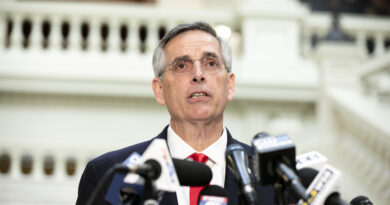The aftermath of Hurricane Helene: Political implications following widespread devastation | US News
The recent images are astounding, as are the figures.
A historic amount of rainfall, totaling forty trillion gallons, has inundated the southeastern part of the United States over the past week, leaving experts in awe.
Rescue and recovery teams have faced challenges reaching some rural communities in North Carolina, with certain areas still inaccessible.
In Asheville, the waters are slowly receding, revealing the incredible power of Hurricane Helene’s rains.
Lacking power, mobile coverage, and safe roads, many places are only visible from the air, making it incredibly difficult for those stranded and those attempting to reach them.
To the southeast of Asheville, rural valleys are just now becoming reachable, painting a clear picture of the overall impact.
The community of Bat Cave has been severely affected, with bridges destroyed and the River Broad’s banks ripped apart.
While some homes are still standing, many are without foundations and face ongoing threats such as potential road collapses and landslides due to forecasted rain.
The devastation caused by this storm spans a vast area. In Valdosta, Georgia, President Trump visited on Monday to assess the aftermath.
His visit may be viewed as a politically-motivated photo opportunity by some, while others may interpret it differently.
In either case, Georgia, like North Carolina, is a crucial swing state. With the presidential election drawing near, Trump’s rhetoric reflects this.
“We pitch in, we persevere, we pull through…” the former president stated before shifting to criticism of the Biden-Harris administration.
“They are not being responsive…” he alleged, claiming that Georgia Governor Brian Kemp was unable to reach President Biden. Governor Kemp, a Republican, refuted this accusation.
Read more:
Hurricane Helene seen from space
Weather reporter abandons live broadcast to rescue trapped woman
In the Oval Office, President Biden responded strongly to Trump’s remarks.
“Let me get this straight,” the president retorted. “He’s lying. And the governor told me he’s lying… I’ve spoken to the governor, I’ve spent time with him and he told me he’s lying, I don’t know why he does this. And the reason I get so angry about it is I don’t care what he says about me, but I care about what he communicates to the people that are in need. He implies that we’re not doing everything possible. We are. We are.”
Vice President Kamala Harris, Trump’s opponent, has not yet traveled to the affected region, citing concerns about disrupting or diverting resources from the ongoing rescue efforts.
Instead, she spent Monday at the Federal Emergency Management Agency (FEMA) pledging assistance and expressing her intention to be on-site at the appropriate time.
“Over the past 24 hours, I have spoken with Governor Kemp of Georgia, Governor Cooper of North Carolina, and many local officials. I have shared with them that we will do everything in our power to help communities respond and recover,” she stated.
“I plan to be on the ground as soon as possible, but as soon as possible without disrupting any emergency response operations, because that must be the highest priority in the first order of business.”
As expected, the situation has become deeply politicized.





